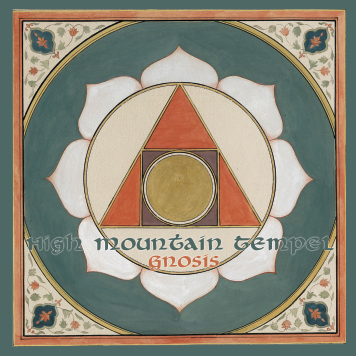Listening to High Mountain Tempel’s new album Gnosis I am reminded of a recent staging of Shakespeare’s The Tempest at the American Repertory Theatre in Cambridge, Massachusetts. During the show, the character of Ariel – the spirit enslaved to the magician Prospero – performed various forms of stage magic, often involving complex card trick and other sleights of hand. The production – co-directed by Teller, the silent half of the magic duo Penn and Teller – offers a variety of illusions, one of the most remarkable being the character of Caliban, who is played by two actors entwined. They speak in unison and roll around the stage, their arms and legs taking turns moving their bodies from place to place.
In the original play, Prospero is at first portrayed as a diabolical wizard, his powerful magic able to conjure storms. But slowly we see him as a man seeking redemption and justice, and by the play’s end, "abjures" his "rough magic". Prospero admits the desire for that kind of knowledge will persist, but vows to refrain no matter the cost. He even releases Ariel from his service. But Teller’s direction does not release the audience from our own need for magic, our eager collective willingness to suspend disbelief and be awed by the illusions on stage. By combining stage magic with a play about supernatural magic, Teller exposes the single most important truth about the occult. Its power lies in the imagination, particularly as it is made manifest between the audience and the magician, the tribe and the shaman, the master of the lodge and the apprentice.
All this is to say that Gnosis is a brilliant evocation of a magical ritual that pulses between the deeper spiritual desire for, well, "gnosis", and the recognition that the staging is everything. This fifth outing by the team of Eric Nielsen and Keith Boyd invites other fascinating musicians into their sacred fold, including Isis Aquarian, one of the wives of the late Father Yod. (A recent documentary, The Source Family, is very good primer on the family, their beliefs and music, and the mercurial character of Father Yod himself). Other initiates into the Tempel include Bruce McKenzie from Buzz or Howl, and Higashi Hiroshi and Kawabata Makoto from Acid Mother’s Temple. The latter mellow out their typically noisy psychedelic flourishes in favour of building up the album’s sacred space.
The opening track ‘Processional (An Invocation to Thee Angelic Sister) is an invitation to disarm and disrobe and to don the band’s garment; a collage of keyboard, guitar, synthesiser, and voice. This is not a fire on the top of the mountain. There is no thunder here. The song is a vaguely melancholic entreaty to suspend disbelief and let the magicians perform their illusions. At the outset, a voice gives warning: "Here come the birds to take it all away."
‘The Wormwood Parchments (Navigating Cameron’s Star)’ gives nod to the 1955 film The Wormwood Star, a micro-documentary about Marjorie Cameron’s work, the artist and sorceress who was married to the rocket scientist/occultist Jack Parsons and was an actress for Kenneth Anger. The song is a haunted ambient piece. There are ominous spirits at the edges, and it furthers the sense that the listener is not only an observer in the proceedings, but a participant. Like the legerdemain of The Tempest, the magic is what is happening between the listener and the performers.
Similarity with the next piece. In ‘Once Upon a Golden Mountain’ Isis Aquarian’s ‘Alpha crone incantations’–underscored by piano–sweep away the infernal sensibility of ‘The Wormwood Parchments’ and offer something that is akin to the feeling of taking a deep breath after you have realised how long it had been since you had one.
The fourth song on the five-track album, ‘Root Food, Deer-Mating (Moon Psalm)’, a guitar-heavy landscape, is another foreboding moment. The procession has seemed to move outside into the the dark of the woods to see if Pan will make himself known. It opens with a flute as a call to the god, and when he does appear, the music reflects exactly what one would expect to feel in the presence of the divine; pretty terrified. The final song ‘Vu Lan Ghost’ is named after The Ghost Festival, a Buddhist version of All-Hallows Eve and is something like a seance. Here, disembodied voices are channeled through some kind of electro-acoustic machine. The Ghost Festival is ancient, but High Mountain Tempel are still modern-day musicians.
As I have written before, I am deeply skeptical, and maybe even a little annoyed, with occultism that is too earnest, too literal. Umberto Eco once wrote that it was important not to "turn metaphysics into mechanics", and the best way to avoid that danger is to rely on art as the means of whatever occult expression you are trying to make. Too much earnestness in music can also come across as cloying and a little contrived, but High Mountain Tempel are sincere in what they are doing. There is no humour here, no ironic nod to the listener, something you might find on a Ghost Box Records release that wear their pop culture influences on their sleeves. But High Mountain Tempel don’t have to. It’s as when the audience watching Ariel perform his feats of magic during The Tempest. We knew it was an illusion but it didn’t matter. Theatre is by definition a kind of magic, originally a rite where the audience encountered the gods directly, knowing all the while it is actors in costume. Gnosis is a ritual for the imagination. All you have to do is wait for the first song to start and allow yourself to be spellbound.
<div class="fb-comments" data-href="http://thequietus.com/articles/15734-high-mountain-tempel-gnosis-review” data-width="550">


